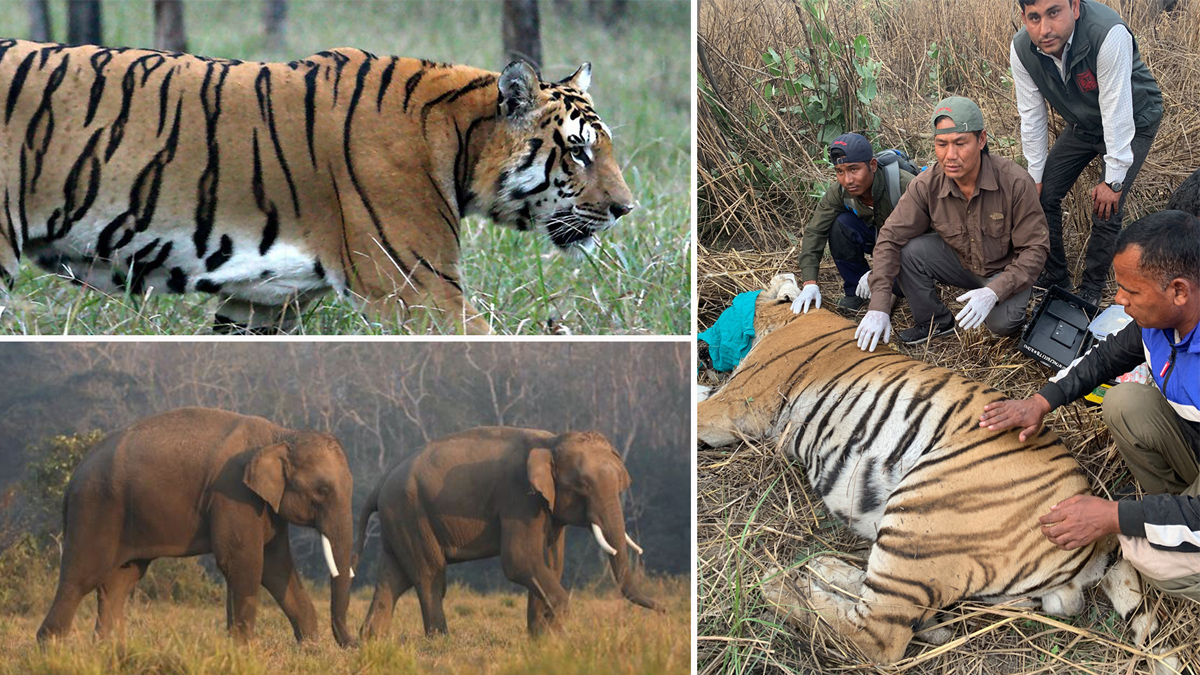
Human-Wildlife Conflict: 200 killed in 5 years

At a time when Nepal has been receiving accolades in the international forums for its environment conservation efforts in recent years, the increasing human-wildlife conflict and the millions of amount being spent by the government in compensation has been cause for concern.
Wild animals are entering human settlements due to human encroachment on their habitat, increasing density and haphazard usage of land, especially around the protected area among others.
People in the vicinity of the protected areas are bearing the brunt of human-wildlife conflict with wild animals claiming human lives. Economic loss is equally working due to the animal attacks.
A total of 197 fatalities have been recorded in the attacks of wild animals, such as elephants, tigers, rhinos, cheetahs, bears and wild dogs among others in the last five years. The government of Nepal has already distributed over Rs 600 million in compensation to the victims’ families during this period.
The conflict between human and wild animals is taking a toll on human properties, such as houses, shed and shelters made for domestic animals and crops among others.
In the fiscal year 2079/80, 36 deaths from animal attacks were reported while over Rs 100 million was doled out in compensation, according to the Department of National Parks and Wildlife Conservation.
Among the deaths, fourteen accounted for mammoth attacks, 12 for tiger, four for rhino, three for cheetah, two for wild boar and one for bear, according to the statistics of the Department.
Similarly, 46 sustained minor injuries while 97 were critically injured. Crops in huge amounts were damaged in the human-wildlife conflict and the wild animals going the rampage post-conflict.
Similarly, 58 people lost their lives from wildlife attacks across the country in the fiscal year 2078/79 BS, 72 got minor injuries and 116 sustained critical injuries. A total of 12,672 cases of human-wildlife conflict were registered in one year.
The highest number of people (23) were killed in the Tusker attack. Likewise, a total of 155.8 million was distributed as a relief for the damage caused by wildlife during the period.
Officiating Director General of the Department, Ajay Karki, said cases of human-wildlife conflict had increased and the number of people losing their lives, as well as relief and compensation, also ratcheted up.
The Ministry of Forest and Environment has recently added nilgai and monkey to the list of wildlife hostile to humans, to which, the government would manage compensation. The proposal is in the final phase of approval from the Cabinet.
He shared that the Department had been carrying out activities to control human-wildlife conflict based on available resources and budget. Mainly, human should change their behaviour to reduce human-wildlife conflict, Karki stressed.
Likewise, 40 people were killed from wildlife attacks across the country in the fiscal year 2077/78 BS. A total of 98 people suffered minor injuries while 67 were critically injured.
The highest number of people were killed from elephant and tiger attacks in the fiscal year 2077/78 BS. Thirteen people lost their lives in elephant and tiger attacks. A total of Rs 149.3 million was distributed as a relief during the period.
Similarly, in the fiscal year, 2076/077, a total of 33 persons lost their lives in the attack of wild animals. Similarly, 67 persons got normal injuries and 110 got serious injuries. The marauding animal to take people’s lives was the elephant. Over Rs 166 million was spent on compensation.
In the fiscal year, 2075/76, 30 persons lost lives in the animal attack while 137 were injured in the assault. The government spent Rs 89 million in compensation.
Country Representative of the World Wildlife Fund in Nepal, Dr Ghana Shyam Gurung, stressed the need for providing adequate alternatives to people in the vicinity of parks so that they would not enter the forest to ensure livelihood. The wild animals in crisis could also be rescued, he suggested.














Comments